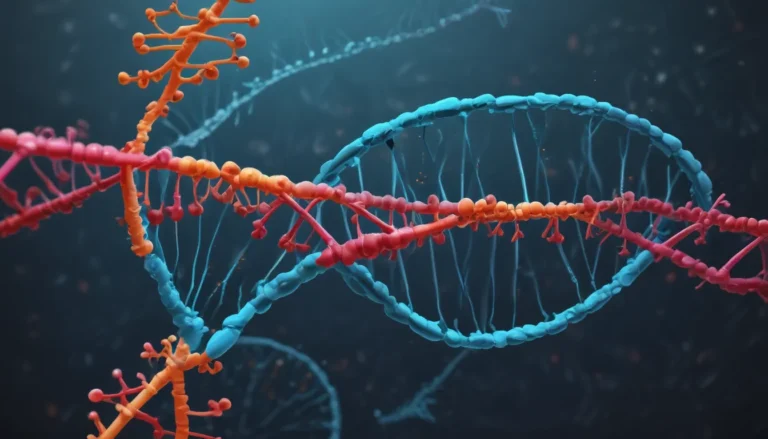A Note About Images: The images used in our articles are for illustration purposes only and may not exactly match the content. They are meant to engage readers, but the text should be relied upon for accurate information.
Are you curious about the tiny yet mighty world of viruses? Virology, a branch of microbiology, delves into the study of these microscopic infectious agents that have the power to cause a range of diseases in humans, animals, and plants. As we unravel the complexities of viruses, we discover fascinating facts that highlight their diversity and impact on our lives. Join us on this journey as we explore 19 surprising facts about virology that will ignite your curiosity and deepen your understanding of these elusive entities.
The Enigmatic Nature of Viruses
Viruses: The Non-Living Intruders
Viruses blur the lines between living and non-living entities, challenging conventional definitions of life. While they lack the ability to reproduce or carry out metabolic functions independently, viruses can multiply within a host organism, hijacking cellular machinery to propagate.
An Abundance Beyond Imagination
The sheer abundance of viruses is nothing short of astonishing. With an estimated 10^31 virus particles populating the biosphere, viruses outnumber all other organisms combined, surpassing even the stars in the universe.
Unveiling the Secrets of Virology
Virology, the science dedicated to the study of viruses, delves into their intricate structure, classification, genetics, and interactions with hosts. Through virology, researchers gain invaluable insights into viral behavior and pave the way for innovative advancements in medicine and biotechnology.
The Versatile World of Viruses
Broad Host Range
Viruses are not limited to infecting humans; they can also target animals, plants, and even bacteria. Their ability to cause diseases across various organisms underscores the adaptability and diversity of these microscopic entities.
Surpassing Size Expectations
Among the myriad of viruses, one stands out for its remarkable size. Discovered in Siberian permafrost in 2014, the Pithovirus sibericum measures about 1.5 micrometers in length, surpassing the dimensions of many bacteria.
Mutualistic Relationships
While viruses are often associated with disease, some have evolved to establish mutualistic or symbiotic relationships with their hosts. These beneficial viruses provide advantages such as increased resistance to other pathogens, highlighting the nuanced interactions within the viral world.
Evolutionary Insights from Virology
Historical Milestones
The journey of virology began with the discovery of the tobacco mosaic virus in 1892 by Russian scientist Dmitri Ivanovsky. This groundbreaking revelation laid the foundation for understanding the infectious nature of viruses and their impact on various organisms.
Disease Origins and Impacts
Viruses are the culprits behind a multitude of diseases, ranging from the common cold and influenza to severe conditions like HIV/AIDS and the recent COVID-19 pandemic. Their ability to trigger widespread illnesses underscores the importance of virology in combating infectious diseases.
Uncovering Scientific Marvels
Research on viruses has led to pivotal scientific breakthroughs in fields such as molecular biology, immunology, and genetic engineering. The study of viruses continues to expand our knowledge of these enigmatic entities and their intricate interactions with hosts.
Therapeutic Strategies in Virology
Integration and Genetic Influence
Certain viruses can integrate into the host genome, becoming part of the host’s genetic material. This integration can have far-reaching effects on the host’s evolution and may contribute to the development of diseases like cancer.
Transformative Role of Vaccines
Vaccines have played a pivotal role in controlling and eradicating viral diseases, such as smallpox and polio. These innovative preventive measures have significantly reduced the burden of viral infections and saved countless lives.
Adapting to Viral Evolution
The mutability of viruses poses challenges as they undergo genetic mutations, giving rise to new strains. These evolving strains can complicate the development of effective treatments and vaccines, highlighting the importance of ongoing vigilance in virology.
Advancements in Antiviral Therapy
Targeted Drug Development
Antiviral therapy focuses on developing drugs that specifically target viral infections, inhibiting viral replication or entry into host cells. These targeted therapies play a crucial role in treating and managing viral illnesses.
Gene Therapy Innovations
Viruses have been harnessed in gene therapy to deliver therapeutic genes into cells, offering potential treatments for genetic disorders. By leveraging the infective properties of modified viruses, scientists explore new avenues for medical interventions.
Evolutionary Interplay
The interplay between viruses and host organisms has contributed significantly to the evolution of life on Earth. Through the transfer of genetic material, viruses have shaped the genetic diversity of both viruses and their hosts, influencing the intricate tapestry of life.
Embracing the Dynamic Field of Virology
Virologists at the Forefront
In times of viral outbreaks, virologists play a pivotal role in studying the virus, developing diagnostic tools, and aiding in the creation of vaccines and treatments. Their expertise and dedication are instrumental in safeguarding public health and mitigating the impact of infectious diseases.
Continuous Discoveries in Virology
Virology remains an ever-evolving field, with ongoing research uncovering new facets of viral biology, host interactions, and potential applications in medicine and biotechnology. Each discovery paves the way for innovative solutions in combating viral infections and advancing public health.
Navigating the Complexities of Virology
In conclusion, the realm of virology offers a captivating journey into the mysteries of viruses and their profound influence on human health and the environment. From historical milestones to cutting-edge therapies, virology stands as a beacon of innovative discoveries that shape our understanding of infectious diseases. As we delve into the 19 surprising facts about virology, we gain a deeper appreciation for the intricate world of viruses and the vital role of virologists in combating viral threats.
FAQs
What is virology?
Virology is the study of viruses, encompassing their properties, structure, classification, and interactions with hosts.
What are some common viral diseases?
Common viral diseases include influenza, measles, HIV/AIDS, hepatitis, and the common cold.
How do viruses differ from other microorganisms?
Unlike bacteria, viruses are considered non-living entities as they rely on host cells for replication and metabolic processes.
Can viruses be treated with antibiotics?
Antibiotics are ineffective against viral infections; antiviral medications are used to target and treat viral illnesses.
How do vaccines function?
Vaccines stimulate the immune system to generate a protective response against specific viruses, providing immunity against future infections.
Are viruses beneficial?
Some viruses play beneficial roles in ecosystems, population control, gene therapy, and cancer treatment, highlighting their multifaceted nature.
How do viruses evolve and adapt?
Viruses evolve through mutations and genetic recombination, allowing them to adapt to new hosts, evade immune responses, and develop resistance to drugs.
What measures can prevent viral infections?
Practicing good hygiene, receiving vaccinations, and avoiding close contact with infected individuals are key strategies to prevent the spread of viral infections.
Embark on a Viral Quest of Discovery
As we embark on a journey through the captivating world of virology, we unveil the intricacies of viruses and their profound impact on life as we know it. From the evolution of viral therapies to the critical role of virologists in combating infectious diseases, every facet of virology offers a wealth of knowledge waiting to be explored. Through ongoing research and relentless dedication, we navigate the complexities of virology, armed with curiosity and a passion for discovery. Join us in unraveling the mysteries of viruses and embracing the boundless possibilities that await in the dynamic field of virology.






